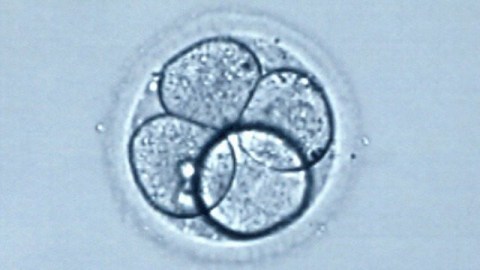Amendment 62: Colorado to Vote on Whether Fertilized Eggs Are People (Again)

Imagine if a state defined embryos as people, giving full legal protections and rights to a collection of cells the size of the ball on a fine-tipped pen? Sound like science fiction? In reality, it’s a decision voters in Colorado will face as they consider a “personhood” referendum on the ballot this November.
Over the coming weeks, Trina Stout, a graduate student in public communication at American University, will be tracking at AoE the communication dynamics of this campaign. In her first guest post, she provides context and details on the debate.–Matthew Nisbet
This November, Coloradans will decide whether to grant fertilized human eggs full legal rights by voting on Amendment 62, which states: “the term ‘person’ shall apply to every human being from the beginning of the biological development of that human being.”
If this sounds familiar, it’s because two years ago Colorado defeated a similar personhood measure by a 3-1 margin; the 2008 version attempted to define a person as “any human being from the moment of fertilization.” The new language is deliberately more expansive in order to account for cells created in laboratories.
In the weeks leading up to Election Day in November, I’ll examine personhood campaigns as an abortion-banning tactic, the communication strategies of its supporters and opponents, and the effect of Amendment 62 on Colorado and national politics. But today, it’s important to provide some basic background.
Who Supports Amendment 62? Who Opposes It?
Personhood Colorado, Colorado Right to Life and Colorado for Equal Rights support the initiative, as well as gubernatorial candidates Dan Maes (GOP) and Tom Tancredo (American Constitution Party). [GOP senate candidate Ken Buck recently reversed his position, saying he would now vote against the measure.]
Yet though these candidates might see political opportunity in the referendum, a personhood law would be so sweeping that even major abortion-rights opponents — like National Right to Life, Focus on the Family, Colorado Citizens for Life, and the Catholic Church — are shyingaway from the measure.
Opposing the proposed amendment are Planned Parenthood and a coalition of 48 other organizations, including the Colorado Medical Society, NARAL Pro-Choice Colorado, the Colorado Organization for Latina Opportunity and Reproductive Rights, National Advocates for Pregnant Women, the Interfaith Alliance of Colorado, the American Methodist Episcopal Church, and the National Council of Jewish Women — Colorado Section. Democrats oppose the initiative.
What Is the Impact of the Proposed Amendment?
If passed, and a fertilized human egg were considered a person with the rights of a full citizen, Amendment 62 would:
What Would Actually Happen if Amendment 62 Passed?
If the measure passed, the most likely scenario is that a group such as Planned Parenthood or the ACLU would immediately file suit challenging the constitutionality of the law. The judge would issue a temporary injunction, preventing the law from being enforced pending the outcome of the case. (What happened with the recent Arizona immigration law is a perfect illustration.)
Federal law trumps state law, so anywhere Amendment 62 conflicts with federal protections, such as for abortion and contraception, Amendment 62 could never be enforced. It is unclear if the law would be upheld for other instances.
In sum, even if passed, this law would have no effect on abortion or contraception access for the women of Colorado; it would only result in expensive litigation.
What Are the Communication Strategies?
This doesn’t mean that the referendum campaign isn’t important. Besides the cost and distraction of a legal suit, it represents a dramatic new interpretative battle over a major societal and legal concept.
Personhood proponents are framing the issue as the only morally acceptable way to respect human life, as well as likening the battle over the referendum–and against abortion generally– to the struggle to end slavery.
Opponents of the proposed amendment are attacking it from three perspectives: women’s rights, government intrusion, and religious freedom.
Perhaps most notably, as was the case with Gay Marriage amendments in 2004, the referendum might have important impacts on voter turn out and decision-making in the Governors’ race and key Congressional races.
In my next post, I will examine communication strategies in depth.
–Guest post by Trina Stout





